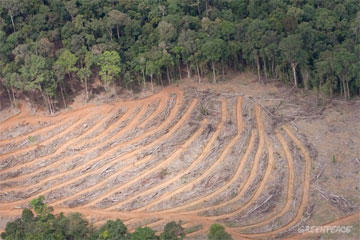Nobel Prize winner condemns lobbyist for using her name in support of his pro-logging agenda.
An industrial lobbyist is facing mounting criticism for his campaign to reduce social and environmental safeguards in Indonesia.
Wangari Maathai, the 2004 Nobel Peace Prize winner for her tree-planting campaign in Africa, blasted lobbyist Alan Oxley for using her name to imply that she supports the large-scale conversion of tropical forests for industrial plantations. Francesca de Gasparis, Director of Maathai’s Green Belt Movement International, told mongabay.com “Maathai emphatically does not support Oxley’s assertion.”
“African countries should seriously focus on climate change and embrace mitigation strategies like protecting indigenous forests,” states the Green Belt Movement’s web site. “While there are no quick fixes, governments must shield citizens from the unavoidable negative impact. One of the strategies is to protect, conserve and restore forests.”
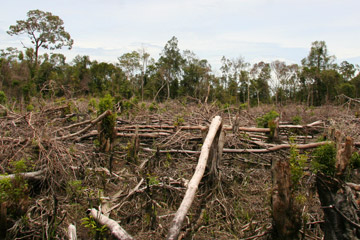 Deforestation in Central Kalimantan, Indonesia |
Meanwhile a group of prominent scientists castigated Oxley, who heads World Growth International, an NGO, and ITS Global, a marketing firm, for his response to their criticism that he is distorting the facts about deforestation in Indonesia. The scientists, led by William F. Laurance of James Cook University, say Oxley has failed to address their specific assertions that his campaigns against environmental protection contain “important inaccuracies or misperceptions”. They suggest Oxley is instead trying to further “muddy the waters” and use the criticism as a platform for his messaging in support of palm oil, timber, and wood-pulp industries.
-
We wrote a serious critique of Alan Oxley and his affiliated organizations, World Growth International and ITS Global. In his reply, Mr Oxley has countered virtually none of our specific, documented assertions. Instead, he has muddied the waters–focusing not on our assertions but on the views of environmental groups such as WWF and Greenpeace.
Mr Oxley’s reply contains some important inaccuracies or misperceptions. Most notably, he understates the environmental impacts of oil palm expansion while ignoring its close linkages with the timber and wood-pulp industries and their collective roles in promoting tropical deforestation and frontier-road expansion. And he ignores entirely a vast body of scientific literature revealing the serious impacts of these industries on tropical biodiversity and greenhouse-gas emissions.
We stand by our original assertions. Alan Oxley, WGI, and ITS rely on the direct financial support of major timber, oil palm, and wood-pulp corporations. Over the past two decades, some of these corporations, such as Rimbunan Hijau and Asian Pulp & Paper, have been among the most chronic environmental offenders in the tropical world.
We assert that Mr Oxley, WGI, and ITS should be regarded as paid lobbyists, not as independent think thanks or NGOs. Mr Oxley refuses to disclose the funders of WGI—a striking lack of transparency. Two environmental groups that Mr Oxley frequently criticizes, WWF and Greenpeace, are open about their funders. Why not do the same?
The twelve scientists who drafted our letter did so without communicating with any environmental organization. Each of us is regarded as a leader in our respective field, and as such we felt a responsibility to take a stand. Alan Oxley, WGI, and ITS seemingly attempt to cast all who disagree with them, no matter their professional background or the seriousness of their arguments, as extremists. In the realm of public discourse, this is not ‘fair play’.
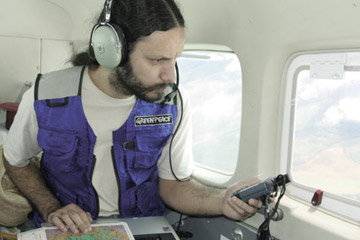
Greenpeace says the lower picture shows misconduct by PT Bangun Nusa Mandiri, a Sinar Mas company. Photo taken on July 5, 2010 by Rante (© Rante/Greenpeace). |
Oxley maintains he is working on behalf of the rural poor, yet he is quick to attack anyone who criticizes any of his corporate clients as rabid environmentalists with an anti-development agenda. Lately he’s been particularly active on behalf of Sinar Mas holding companies, including PT SMART, a palm oil company, and Asia Pulp & Paper (APP), which have been under pressure from NGOs for conflict with communities and deforestation in Sumatra and Kalimantan. Asia Pulp & Paper, last week admitted to supporting the sorts of “front groups” cited by the scientists in their letter.
“We will use groups like Greenspirit to independently assess our business just as we will use different groups to monitor our continued improvement against our carbon footprint baseline, our certification performance, our social responsibility programs and our chain of custody policies,” Ian Lifshitz, Sustainability & Public Outreach Manager for APP’s Americas division, told mongabay.com. “At the same time we will support groups like the Consumer Alliance for Global Prosperity that respect the right and need for emerging economies to have the opportunity to develop their economies.”
Related articles
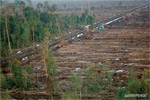
Scientists blast greenwashing by front groups
(10/27/2010) A group of prominent scientists has published an open letter challenging the objectivity of World Growth International, an NGO that claims to operate on behalf of the world’s poor, and its leader Alan Oxley, a former trade diplomat who also chairs ITS Global, a marketing firm. The letter, published online in several forums, slams World Growth and ITS Global as a front groups for forestry companies. The scientists note that while the groups have not disclosed their sources of funding, they assert ITS receives funding from Sinar Mas, an Indonesian conglomerate that controls Asia Pulp & Paper (APP), a forest products brand, and Sinar Mas Agro Resources & Technology, a palm oil firm, among other companies.
Misleading claims from a palm oil lobbyist
(10/23/2010) In an editorial published October 9th in the New Straits Times (“Why does World Bank hate palm oil?”), Alan Oxley, a former Australian diplomat who now serves as a lobbyist for logging and plantation companies, makes erroneous claims in his case against the World Bank and the International Finance Corp (IFC) for establishing stronger social and environmental criteria for lending to palm oil companies. It is important to put Mr. Oxley’s editorial in the context of his broader efforts to reduce protections for rural communities and the environment.
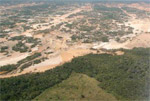
Corporations, conservation, and the green movement
(10/21/2010) The image of rainforests being torn down by giant bulldozers, felled by chainsaw-wielding loggers, and torched by large-scale developers has never been more poignant. Corporations have today replaced small-scale farmers as the prime drivers of deforestation, a shift that has critical implications for conservation. Until recently deforestation has been driven mostly by poverty—poor people in developing countries clearing forests or depleting other natural resources as they struggle to feed their families. Government policies in the ’60s, ’70s, and ’80s had a multiplier effect, subsidizing agricultural expansion through low-interest loans, infrastructure projects, and ambitious colonization schemes, especially in the Amazon and Indonesia. But over the past two decades, this has changed in many countries due to rural depopulation, a decline in state-sponsored development projects, the rise of globalized financial markets, and a worldwide commodity boom. Deforestation, overfishing, and other forms of environmental degradation are now primarily the result of corporations feeding demand from international consumers. While industrial actors exploit resources more efficiently and cause widespread environmental damage, they also are more sensitive to pressure from consumers and environmental groups. Thus in recent years, it has become easier—and more ethical—for green groups to go after corporations than after poor farmers.
Asia Pulp & Paper fumbles response to deforestation allegations by Greenpeace

(09/28/2010) A new audit that seems to exonerate Asia Pulp & Paper from damaging logging practices in Indonesia was in fact conducted by the same people that are running its PR efforts, raising questions about the much maligned company’s commitment to cleaning up its operations. The audit slams Greenpeace, the activist group that accused Asia Pulp & Paper (APP) of illegal and destructive logging in Sumatra in its July 2010 report, How Sinar Mas is Pulping the Planet. It runs through each of the claims laid out in the Greenpeace report, arguing some are speculative or improperly cited. But the audit doesn’t actually deny that APP is clearing forests and peatlands for pulp plantations. In fact, the audit effectively confirms that the company is indeed engaged in conversion of ‘deep’ peat areas, but argues that this activity isn’t illegal under Indonesian law.
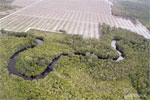
(08/19/2010) Sinar Mas, an Indonesian conglomerate whose holdings include Asia Pulp and Paper, a paper products brand, and PT Smart, a palm oil producer, was sharply rebuked Wednesday over a recent report where it claimed not to have engaged in destruction of forests and peatlands. At least one of its companies, Golden Agri Resources, may now face an investigation for deliberately misleading shareholders in its corporate filings.
Nestle’s palm oil debacle highlights current limitations of certification scheme
(03/26/2010) Last week Nestle, the world’s largest food processor, was caught in a firestorm when it attempted to censor a Greenpeace campaign that targeted its use of palm oil sourced from a supplier accused of environmentally-damaging practices. The incident brought the increasingly raucous debate over palm oil into the spotlight and renewed questions over an industry-backed certification scheme that aims to improve the crop’s environmental performance.
Consumers should help pay the bill for ‘greener’ palm oil

(01/12/2010) Palm oil is one of the world’s most traded and versatile agricultural commodities. It can be used as edible vegetable oil, industrial lubricant, raw material in cosmetic and skincare products and feedstock for biofuel production. Growing global demand for palm oil and the ensuing cropland expansion has been blamed for a wide range of environmental ills, including tropical deforestation, peatland degradation, biodiversity loss and CO2 emissions. In response to these concerns, a group of stakeholders—including activists, investors, producers and retailers—formed the Roundtable on Sustainable Palm Oil (RSPO) to develop a certification scheme for palm oil produced through environmentally- and socially-responsible ways. It is widely anticipated that the creation of a premium market for RSPO-certified sustainable palm oil (CSPO) would incentivize palm oil producers to improve their management practices.
Blackwashing by NGOs, greenwashing by corporations, threatens environmental progress
(11/12/2009) Misinformation campaigns by both corporations and environmental groups threaten to undermine efforts to conserve biodiversity and reduce environmental degradation, argues a new paper published in the journal Biotropica. Growing concerns over climate change and unsustainable resource extraction have put companies that exploit the environment in the spotlight. Some firms have responded by taking measures to reduce their environmental impact. Others have alternatively engaged in sophisticated marketing campaigns intended to mislead consumers on their environmental performance, maintaining that environmentally-destructive practices are instead benign. At the same time some activist groups have been guilty of exaggerating claims of environmental misconduct in order to boost support for their campaigns and therefore their fundraising efforts.


